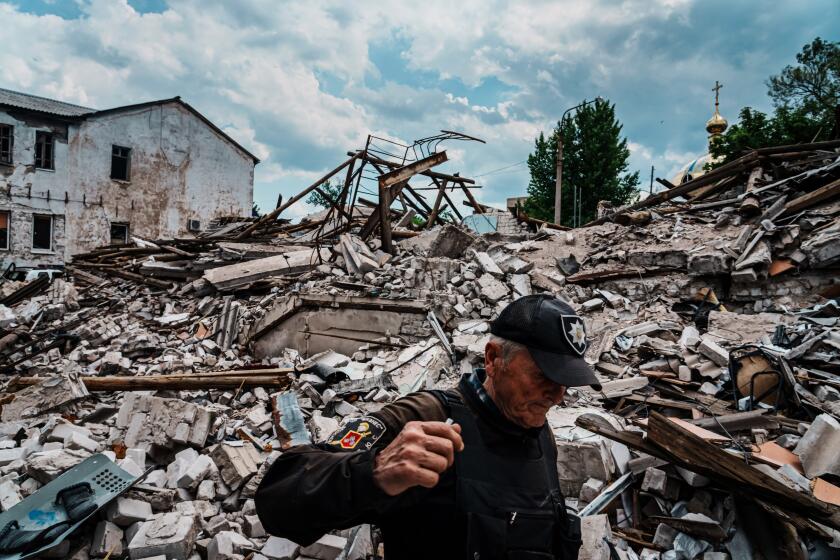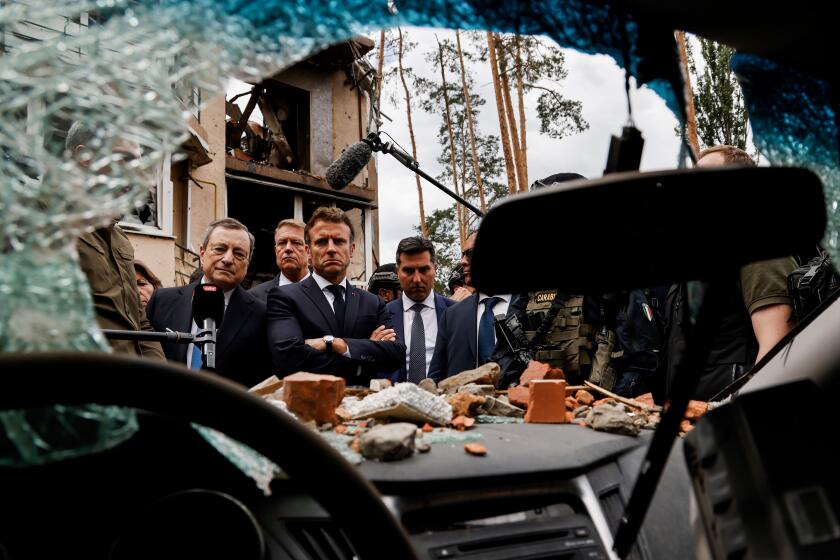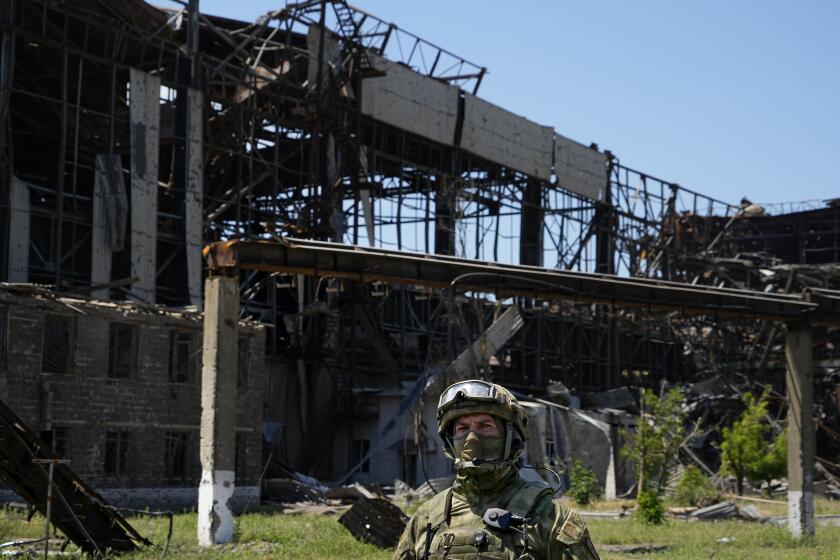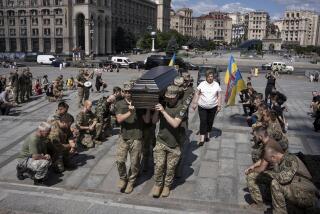Ukraine mourns a young activist who sacrificed his best years in the cause of freedom
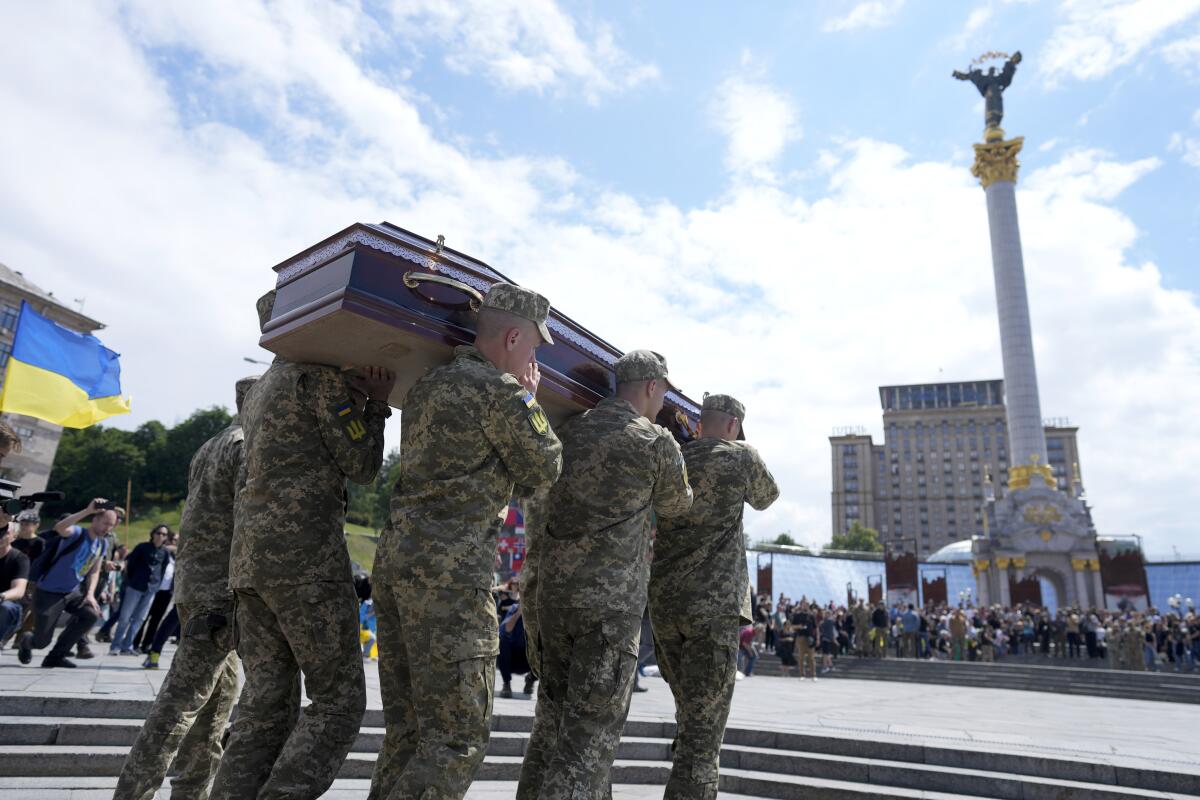
KYIV, Ukraine — Poppies, the blood-red flowers that cover the battlefields of Europe’s two world wars, were laid in mourning Saturday on the coffin of yet another dead soldier, this one killed in yet another European war, in Ukraine.
The hundreds of mourners for Roman Ratushnyi, 24, included friends who had protested with him during months of demonstrations that toppled Ukraine’s pro-Russia leader in 2014 and who, like him, took up arms when Moscow launched its full-scale invasion of its neighbor this February.
The arc of his life symbolized that of Ukraine’s post-independence generations that are sacrificing their best years in the cause of freedom. First, with defiance and dozens of lives against brutal riot police during Ukraine’s Maidan protests of 2013-14, and now with weapons and even more lives against Russian President Vladimir Putin’s troops.
“Heroes never die!” friends, family and admirers shouted in Ukrainian as Ratushnyi’s coffin was loaded aboard a hearse on a square in the Ukrainian capital now decorated with destroyed Russian tanks and vehicles.
Their charred hulks contrasted with the shiny gold domes of an adjacent cathedral where priests had earlier sung prayers for Ratushnyi, who was well-known in Kyiv for his civic and environmental activism.
From the square, the mourners walked in a long silent column behind his coffin to Maidan Nezalezhnosti, or Independence Square. The vast plaza in central Kyiv gave its name to the three months of protests that overthrew then-President Viktor Yanukovich in 2014 and helped fuel the political and patriotic awakening of Ukrainians born after independence in 1991.
Ratushnyi had “a heart full of love for Ukraine,” said Misha Reva, who traveled overnight in his soldier’s uniform from front lines in the east to say goodbye to the friend he met for the first time on Maidan, in the midst of the protests. Ratushnyi was then just 16; Reva was in his early 20s. It was Ratushnyi who introduced Reva to the woman who is now his wife, also on the square.
Ukraine is in a brutal artillery war, the kind not seen since World War I. Lacking better weapons, it is losing as many as 6,000 soldiers a month.
While the funeral was underway in central Kyiv, President Volodymyr Zelensky made a trip south to visit troops and hospital workers in the Mykolaiv and Odesa regions along the Black Sea. He handed out awards to dozens of people at every stop, shaking their hands and thanking them again and again for their service.
Among the troops he met were many women, dressed in camouflage and ballistic vests. At a hospital in Odesa, he awarded the rank of major general to the woman who commands the Ukrainian army’s medical forces.
“War is on the front line where our soldiers are, our army. But you also are on the front line, protecting our lives, helping wounded soldiers, helping the civilians who turn to you every day,” Zelensky told the assembled civilian and military medical staff in Odesa. “We are proud that we have such doctors in our country.”
He also met with regional leaders in Mykolaiv and Odesa and went with them to see buildings that had been destroyed in Russian attacks that took the lives of many civilians.
In other developments Saturday, British Prime Minister Boris Johnson expressed concerns “that a bit of Ukraine fatigue is starting to set in around the world” and said Ukraine must be supported in trying to turn back the Russian invasion to “make sure the Ukrainians are not encouraged to go for a bad peace, something that simply wouldn’t endure.”
“It would be a catastrophe to let Putin win,” Johnson said. “He’d love nothing more than to say, ‘Let’s freeze this conflict, let’s have a cease-fire.’ For him that would be a tremendous victory. You’d have a situation in which Putin was able to consolidate his gains and then to launch another attack.”
Johnson spoke on his return from a surprise trip Friday to Kyiv, where he met with Zelensky to offer continued aid and military training.
The leaders of France, Germany and Italy travel to Kyiv to show their support for Ukraine, though some critics say Europe is not doing enough.
Western-supplied heavy weapons that Ukraine has been pushing for are reaching the front lines, although not in quantities that Ukrainian officials say are needed to push back Russian forces to positions they occupied before the invasion or beyond.
The Associated Press was granted rare access Saturday to witness the firing of U.S.-supplied M777 howitzers on Russian positions in Ukraine’s eastern Donbas region. The powerful artillery pieces are helping Ukrainian forces reply in kind to Russian batteries that have been pounding towns and villages to rubble.
In Kyiv on Saturday morning, the bells of St. Michael’s Cathedral tolled as four soldiers carried Ratushnyi’s coffin to the memorial service, held outdoors in the church’s sunlit courtyard. Poppies and a traditional loaf of bread were placed on the coffin covered with Ukraine’s blue and yellow flag.
During the Maidan protests, when riot police used batons and eventually bullets with deadly abandon, Ratushnyi and Reva had taken shelter together for one night inside the cathedral grounds, the friend recalled.
“He was such a solid and big personality,” Reva said. “It’s a great loss for Ukraine.”
The friends signed up to fight on the first day of the Russian invasion Feb. 24, Reva said. After taking part in the defense of Kyiv in the assault’s opening weeks, Ratushnyi then joined an army brigade, doing military intelligence work, Reva said.
The fight over Severodonetsk has moved into the city center, officials say, as Russia ramps up its artillery offensive and its military spending.
Reva, 33, reported that two soldiers were killed and 15 more injured Thursday in fighting in the area where he’s been stationed.
“People get killed every day on the front line,” he said.
Ratushnyi was killed June 9 around the town of Izyum on the war’s eastern front, according to the environmental campaign group that he led in Kyiv. Before the invasion, he fought for the preservation from development of a wooded park where people ski in winter.
“He was a symbol, a symbol of a new Ukraine, of freedom and a new generation that wants to fight for its rights,” said Serhli Sasyn, 21.
The “best people are dying now.”
More to Read
Sign up for Essential California
The most important California stories and recommendations in your inbox every morning.
You may occasionally receive promotional content from the Los Angeles Times.
